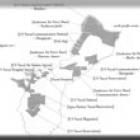Energy (and) Colonialism, Energy (In)Dependence: Africa, Europe, Greenland, North America
About this issue
What does history tell us about energy transitions? What do energy transitions tell us about the history of colonialism? This volume of RCC Perspectives presents five histories of colonial projects that transformed potential energy sources in Africa, Europe, North America, and Greenland into mechanical energy for wealth production.
Content














